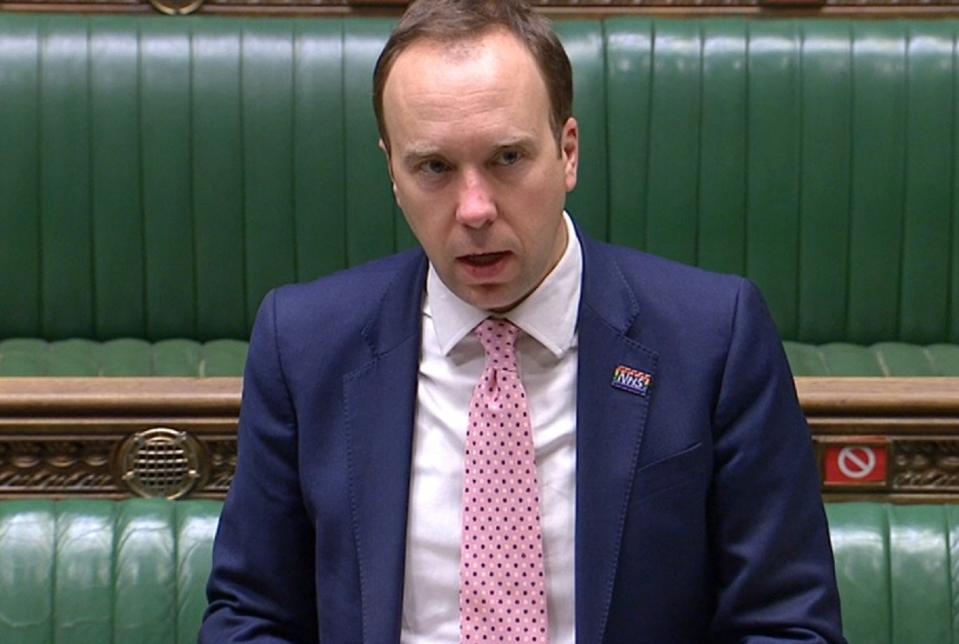Three-quarters of England under tier 4 as Hancock extends Covid restrictions

The Midlands and northeast of England, along with parts of the northwest and southwest, are to be moved into the toughest tier 4 level of coronavirus restrictions from Thursday, health secretary Matt Hancock has announced.
The move means that around 75 per cent of the population of England is now under “stay home” orders, with almost all of the rest moved into the stringent tier 3, which requires the closure of all hospitality venues except for takeaway and delivery and imposes strict limits on social contact.
Details were announced by Mr Hancock in a statement to the House of Commons to update them on the soaring figures for infections and hospitalisations from Covid-19.
Areas placed into tier 4 at a minute past midnight on the morning of New Year’s Eve include Greater Manchester, Newcastle, Birmingham, Stoke, Derby and Nottingham.
In the Midlands, the whole of Leicestershire, Lincolnshire, Northamptonshire, Derbyshire, Nottinghamshire, Warwickshire and Staffordshire move into tier 4 along with Birmingham and the Black Country, Coventry and Solihull.
In the northwest, Greater Manchester, Warrington, Lancashire, Cheshire and Cumbria go into the highest tier.
In the northeast, the Tees Valley, County Durham, Northumberland, Newcastle, North and South Tyneside, Sunderland and Gateshead go into tier 4, as do Gloucestershire, Somerset, Swindon, Bournemouth, Christchurch, Poole, the Isle of Wight and the New Forest in the southwest.
With London, the southeast and east of England already in the toughest near-lockdown level of controls, the addition of 20 million people in the new areas means a total of 44 million people will now be in tier 4, or 78 per cent of the population of England.
A further 12.2m (22%) are in tier 3, with none in tier 2 and just 2,000 people in the Isles of Scilly in the “medium level” tier 1.
Areas moving into tier 3 on Thursday include the Liverpool City Region, which was one of the few parts of England ever to escape the higher levels of restriction, following its successful campaign of mass testing.
Also moving into the “very high alert” level are Rutland, Shropshire, Telford & Wrekin, Worcestershire, Herefordshire, York, North Yorkshire, Bath and North East Somerset, Devon, Plymouth, Torbay, Cornwall, Dorset and Wiltshire.
Mr Hancock said that today’s approval of the Oxford/AstraZeneca vaccine meant that “everyone who wants one” can get a jab to protect them against Covid-19, providing a “route out of this crisis” for the UK.
He said that 530,000 doses were available from Monday, with millions more by the beginning of February, bringing forward the day when all coronavirus restrictions can be lifted.
But he added: “We must act to suppress the virus now, not least because the new variant makes the time between now and then even more difficult.
“Sharply rising cases and the hospitalisations that follow demonstrate the need to act where the virus is spreading."
Mr Hancock said: “The new variant means that three quarters of the population are now going to be in Tier 4 and almost all of the country in Tiers 3 and 4.
“And I know that Tier 3 and 4 measures place a significant burden on people, and especially on businesses affected, but I am afraid it is absolutely necessary because of the number of cases that we’ve seen.
“But where we are still able to give places greater freedoms, we will continue to do so.”
Shadow health secretary Jon Ashworth said Labour would support the tougher regulations, and called for vaccinations to be accelerated to bring an end to the pandemic as quickly as possible.
“Mass vaccination needs to start straight away," Mr Ashworth told the Commons. "We need to go hell for leather to get these jabs rolled out with no delay.”
“This is a race against time as the more the virus circulates, the more opportunities it has for further variants to emerge.”
A group of nine civic leaders in the northeast of England, including the leaders of Newcastle, Sunderland and Northumberland councils, called for a national lockdown.
In a statement, they said: “Our view is that the government should consider a national lockdown now to ensure the spread of the new variant is slowed and efforts can be focussed on the crucial roll-out of the vaccine. This is a national problem and a national solution is required now."
Former health secretary Jeremy Hunt warned that allowing primary schools and universities to reopen over the next few weeks represented a “huge risk”.
“The NHS now is busier than it was last April, in parts of London it looks like it may fall over," Mr Hunt told the Commons.
“But back in April schools were shut. Next week primary schools are due to reopen. In September we came to regret allowing university students to go back en masse but some universities are going to start to go back from next week.
"Why in the middle of winter when the NHS is under such pressure, when we have a dangerous new strain of the virus are we taking such huge risks? Shouldn’t our entire focus for the entire eight to 12 weeks be on saving lives?”
Read More
Everything we know about the Oxford Covid vaccine
Tier 4 extended to 75% of England as Oxford vaccine approved - live

 Yahoo Finance
Yahoo Finance 